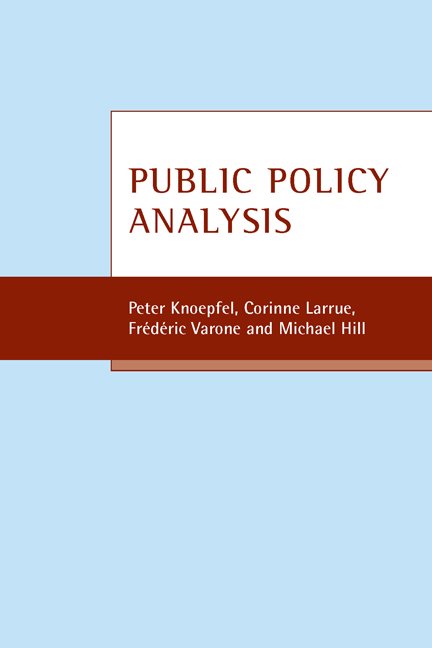three - Policy actors
Published online by Cambridge University Press: 14 January 2022
Summary
We take policy to mean a series of decisions or activities resulting from structured and recurrent interactions between different actors, both public and private, who are involved in various different ways in the emergence, identification and resolution of a problem defined politically as a public one.
In this chapter, we focus on the types of actors concerned by policy, while following chapters will deal with the resources to which these actors have access in order to represent their interests (Chapter Four), on the one hand, and with the institutional context that influences their individual and collective behaviour (Chapter Five), on the other. These three concepts (actors, resources and institutions) constitute the principal focus of our analysis and are the key factors on which we will base our policy analysis model (Part III).
3.1 ‘Empirical actors’
Given that policies embody the results of the interactions between different public and private actors, we must start by defining the actual concept of an actor. For the purposes of this study, the term ‘actor’ can be taken to designate either an individual (a minister, member of parliament, specialist journalist etc), several individuals (constituting for example an office or a section of an administration), a legal entity (a private company, an association, a trade union and so on) or a social group (farmers, drug users, the homeless etc).
Note, however, that a group of several individuals constitutes a single actor insofar as, with respect to the policy under consideration, they are in broad agreement and share a common approach as far as the values and interests that they represent and the concrete aims that they pursue are concerned. This consensus can be arrived at, for example, through the hierarchical structure or through the democratic process.
Talcott Parsons (1951) inspired our approach to the concept of actor. In his view, in order to analyse a social action, we must focus essentially on the simplest unit that retains the significance of what Parsons terms a ‘unit-act’. This elementary act is undertaken by at least one actor who has an objective (bringing about a future state of affairs with a view to which the actions of the actor in question are directed), and who uses certain means to achieve that objective (Bourricaud, 1977, p 31).
- Type
- Chapter
- Information
- Public Policy Analysis , pp. 39 - 62Publisher: Bristol University PressPrint publication year: 2007



